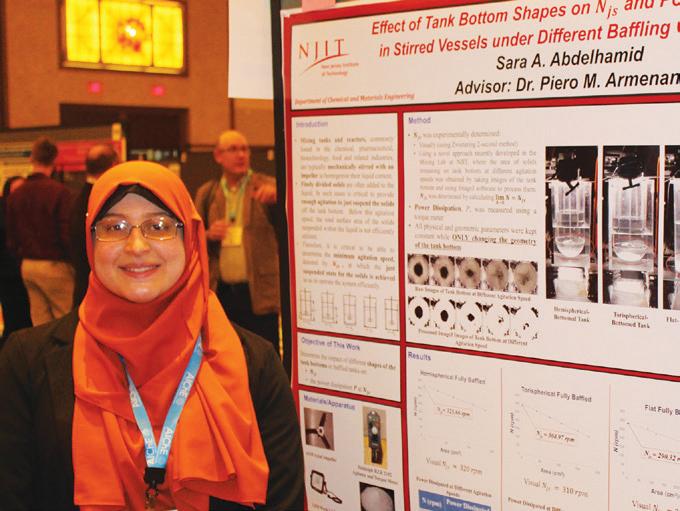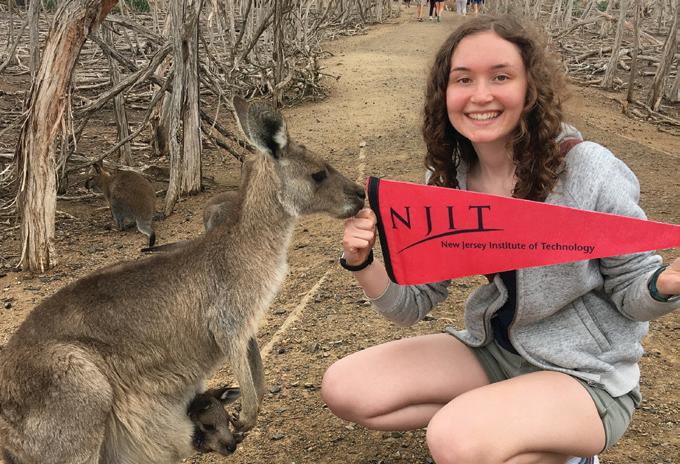
5 minute read
Recognition: Scholarships and Fellowships
RECOGNITION
NJIT 2020 Goldwater Scholar Class Among Largest in U.S.
Of the more than 5,000 applicants this year for the prestigious Barry Goldwater Scholarship, only 396 students from 461 colleges and universities nationwide have been named Goldwater Scholars — four of them are from NJIT. The 2020 NJIT Goldwater Scholar class marks a university record and is the largest from any academic institution in New Jersey, equaling second-most across the nation and beating out universities such as Columbia University (3), Harvard University (3), Massachusetts Institute of Technology (2) and Princeton University (2). Here are the deserving recipients:
Sydney Sweet is a senior majoring in chemical engineering, whose nanoparticle research is aiming to improve health care for Type 2 diabetes patients. During a first-year NJIT Provost Summer Research Fellowship with her professor Xiaoyang Xu, she began a study of hydrogels for the delivery of heart regenerative therapeutics, and contributed on a review paper on nanotechnologymediated devices to treat obesity published in the journal Advanced Healthcare Biomaterials. Since then, she’s earned a $3,000 seed grant for research to improve diabetes drug delivery — work she presented at the 2019 American Institute of Chemical Engineers (AIChE) national conference.
Joseph Torsiello is a junior dual majoring in applied physics and mathematical sciences and is involved in research spanning everything from nanotechnology to mosquitoes. As part of his NJIT Provost Summer Research Fellowship alongside professor Dibakar Datta, he’s been applying molecular dynamics simulations to study friction properties of twodimensional materials, namely graphene,
which could enhance the engineering of nanotechnologies. In other research, with physics professor Benjamin Thomas, he is using a laser-based technology called lidar (light detection and ranging) to measure backscattered light from spinning blades of nanodrones, as well as the wings of flying mosquitoes. He generates numerical simulations that can help monitor mosquito


populations more precisely.
Sara Abdelhamid is a third-year chemical engineering major researching the impact that different bottom shapes of industrial stirring vessels have on the production quality of everything from the taste of our food, to the effectiveness of our drugs, to the texture and fragrance of our home goods. She started her work as a secondyear student in the mixing lab of NJIT Distinguished Professor Piero Armenante, and has since been constructing her own customized mixing systems for her research at NJIT's Makerspace. Her work received first prize in the 2019 AIChE Conference’s Undergraduate Poster Competition. Last semester, she took part in a co-op in Johnson & Johnson’s consumer R&D department, investigating consumer products and ways to overcome production problems.
Philip Zaleski is a senior majoring in applied mathematics who began showing his talents with numbers at an incredibly early age. He started taking AP calculus exams when he was 10, counting toward his college calculus course credits. Arriving at NJIT at age 14, he is currently analyzing and creating mathematical models that explain fundamental physical processes, including how and why charged droplets become unstable. Through his recent NJIT research fellowship with mathematics professor Shahriar Afkhami, he’s published work in the MDPI journal Fluids to better model the behavior of electrified droplets, such as those used in inkjet printing or electrospray ionization mass spectrometry.
Prestigious Fellowships
DONALD “WILL” ANDREWS Humanity in Action Recipient
Donald “Will” Andrews is NJIT’s first-ever recipient of the Humanity in Action Fellowship. The now thirdyear industrial engineering major was scheduled to travel to Berlin for the June fellowship, which centers on diversity, human rights and citizenship around the world. He would have met with community leaders, politicians and activists and toured the city, all as part of an international group of 26 students from Germany, Greece, Bosnia, the United States and other countries. While an in-person experience may come at a later date, the fellowship continued as planned, albeit virtually via Zoom during this time of COVID-19.
Through his fellowship, Will examined democracy and pluralism in modern Germany in the context of the Holocaust. The program required him to complete an individual “action project” that addresses the issues delved into during the fellowship.
“I think it was the focus on preserving the rights of those who historically would not have them, especially now,” Will remarked of what appealed to him about the opportunity. “There are people in unfortunate situations around the world, and there are different contexts for those bad situations.”
MATTHEW CHERREY Fulbright Recipient
Matthew Cherrey is NJIT’s first Fulbright awardee to Germany. He will undertake cybersecurity research at the Technische Universität Darmstadt.
Matthew will create a security model that defines the necessary protection elements in a network security protocol. He will use this model to propose solutions to the defense mechanisms used by secure websites and VPNs. This will ensure that highly sensitive data, such as credit card numbers, medical information and business communications, are properly encrypted while traveling across the internet.
Matthew transferred to NJIT as a secondyear student and discovered his interest in computer science. He has conducted research, interned at Facebook and led campus ministry and homeless outreach as president of the Newman Center.
Of the Fulbright process, Matthew said, “I learned a lot about the country and about myself through the application process. I am really excited to go to Germany … to learn about another culture and share mine.”
DANIEL MEZA Fulbright Recipient
Daniel Meza is the first Fulbright awardee from Hillier College of Architecture and Design. The scholarship will take him to Macquarie University in January 2021, where he will develop a method for creating furniture out of slime mold.
Meza, who dreams of becoming a professional artist, said, “There are a few different things that make slime mold
One of Meza's tables incorporating slime mold.

interesting on the research end. It's one of the few single-cell organisms that you can see with the naked eye. It doesn't have a central nervous system, but it's able to solve problems.”
Meza’s work crosses disciplines, combining an understanding of swarm intelligence with sustainable design principles.
Professor Jose Alcala, of Hillier’s industrial design program, praised Meza’s ingenuity. In a senior thesis project, “He’s using the so-called intelligence of slime mold to help design objects ... the growth pattern, the direction they grow in ... that starts to create a computer model,” Alcala said. “This is a case where success happened because there’s collaboration across campus.”




